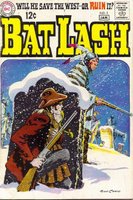And when he couldn't appear in person, he had an amazing habit of sending objects to his son over the years, well after his own death. For example, Krypto, Superboy's dog:

But that was far from the only time that Superboy received a communication from his father. In Adventure #232, an entire city block of Krypton lands (improbably) within walking distance of Smallville. Even more unlikely, it includes Kal-El's childhood home, where he discovers a plea from his father:

He easily handles the first two tasks, but is unable to locate the books that his father wanted him to read. So upset is he, that:

It turns out that the Kryptonians were so advanced that they had their books in movie form. One of them turns out suspiciously to be like Moby Dick, while the others sound even more sleep-inducing.
Apparently these missives from the past were popular with the readers, and so in Adventure #240, we got another one:

Of course as we know, the end of Krypton came unexpectedly early, and so it had taken the super-teacher all that time to locate Kal.
The letters from home continued into Superman's adulthood. In Superman #113, he discovers tapes from his father:

The tapes revealed that Jor-El had been the first Superman.
In Action #314, Aquaman discovers another set of tapes from Jor-El to his son, at the bottom of the ocean:

I talked about that story here.
Those are the ones I know; anybody aware of any others?






7 comments:
Don't be bashing Moby Dick now, Pat!
Great post, though, as always!
Superboy/man's relationship with Jor-El at times is reminiscent of Jesus' with God the Father.
He's Jor-El's miracle-working representative/avatar on Earth; Jor-El "speaks" to his son through miraculous means (his scientific; G the F's preternatural);the son feels the obligation of doing good b/c of his special gifts; Jor-El was rejected by those who had believed in him before and has sent his son to another world.
"Yes, Father -- he always calls Jor-El "father" -- I will do everything you ask." Combine that with the shot of a crying Superboy and you have a Gethsemane moment.
The first Superman movie emphasized this aspect as well.
My guess is that somewhere along the way, some writer has brought this trope to the surface more blatantly.
Ed, as one of the rare folks who've read Moby Dick unabridged, I feel entitled to comment on how tedious it is. Definitely the single book that benefits most from being abridged.
The recent Superman Returns movie had a trailer which made the Jor-El as GtF comparison explicit; IIRC it had a voice-over which said "I so loved the Earth that I sent my only son..." Of course you can see this easily in the SA comics; in several stories Jor-El mentions that Earth is his favorite planet.
Of course, Siegel said that he had another Biblical story in mind; that of Moses.
The great classics of a century and more ago are usually a dull slog to read. The themes and basic ideas are perennial and powerful, but their prose style ain't our prose style. That's why they get made and remade into movies.
Blaze, read the Count of Monte Cristo or anything by Doestoyevsky or Dickens and it's as fresh as the day it was written. The problem with Moby Dick is that Melville was paid by the word and so he padded the book with exhaustive descriptions of every single part of the ship. Great for people who want to rebuild a 19th-century whaler, but not so much for readers looking for entertainment. The parts of the book that are not solely descriptive are actually quite entertaining.
It is most rewarding to read some of those tedious passages aloud and then their poetry comes alive. But I concur, read silently, it is a bit of a slog.
Fr. Dan
It may be wandering rather far afield from the Silver Age of Comics, but to continue...
I do appreciate the great old masters. Don't get me wrong there. But I reckon it is the non sequitur descriptions and tangents they went rambling down that make the story hard to swallow. One of my favourite books of the 19th century, "Three Men in a Boat" is a sharp and witty...and then goes off for a page or two with deep historical observations or poetical philosophy.
But I was in error to suggest this was an antique problem from which we are now free. The modern world is horribly plagued with a trend to pad 200 page novels into 400 pages (or a trilogy). As I think on it, there is a great deal of similarity. Only instead of a few pages of irrelevant description on whaling boats, it's a few chapters. The difference between writing a book with a quill pen and a word processor.
Sure, Jor-El had plenty of time to build a robot teacher to educate the orphan Kal-El....but not enough time to build a family-sized rocket ship to take them all to Earth?
LOL! Great overview, Pat. I'm sure there are several dozen more examples of Jor-El's busy pre-explosion activities, which take "proactive" to an entirely new level. In a strange way, this almost constant post-death presence of Jor-El could be seen as a basis for the green crystal from the Superman movie, which also allowed Jor-El to inform and shape Kal-El's life long after his death.
Post a Comment